As an island country, Taiwan's fishing industry is an important sector, and one of the most profitable farmed fish is eel because of the Japanese market. Eels’ life history had been a mystery, as they are catadromous, meaning they live part of their life in freshwater and part in saltwater. Eel larvae, leptocephalus, hatch in the open sea. After they reach an adequate size, they become glass eels and enter the headwaters of rivers. In the freshwater, they travel upstream and turn into elvers. After further transformation, they eventually reach adulthood and migrate back to the sea. There are several eel species and here we are referring to the Japanese eels, which are pricey in the restaurants.
Most discussions regarding fishery are in economic and scientific terms, we seldom get to know the life of fishermen here. Avant described the life history of eels and explained how it intertwined with fisherman's fate with a photo essay:
鰻魚的習性和鮭魚相反,在溪流生活的成年鰻魚,到了夏季繁殖期,開始降河游到幾千公里外的菲律賓和馬里亞納群島深海產卵。孵化的鰻魚苗隨著北赤道洋流向西流到菲律賓外海後,再接上北上的黑潮洋流。因此,黑潮流經的菲律賓、台灣和日本都有人在捕鰻魚苗。
The behaviors of eels and salmons are different. The adult eels live in rivers. During the reproduction season in summer, they swim downstream toward the deep sea thousands miles away (besides Philippine and the Mariana Islands) to lay their eggs. The hatched leptocephalus drift with the North Equatorial Current toward Philippine. They then drift with the Kuroshio current toward north. Therefore, we can see people in different countries catch glass eels along the way of the Kuroshio Current: Philippine, Taiwan, and Japan.
每年十月到隔年清明將近半年時間,隨著黑潮洋流北上的鰻魚苗,游到宜蘭外海,等待進入蘭陽溪等溪流上游生長。於此同時,也有一批散居基隆、瑞芳、三峽、樹林、三鶯部落等地的花東原住民,追隨鰻魚苗蹤跡,遷移到蘭陽溪出海口。在這半年的扒鰻魚苗季節中,他們在海灘上搭起簡易的帆布工寮,住下來,扒鰻魚。
From October to April, for about half year, these glass eels drifting with the Kuroshio current arrive Yilan, Taiwan and prepare to swim to the upstream of some rivers, including the Lang-Yang river. At the same time, some aboriginal Taiwanese (whose ancestors live in the eastern Taiwan) leave their home in Keelong, Rueifang, Sanshia, Shulin, and Sanyin for the outlet of the Lang-Yang river. They are after the glass eels. In the half-year glass-eel-catching season, they set up temporary canvas tents at the beach so that they can live there and catch the glass eels.

Photo courtesy of Avant.
鰻線,入夜後伺機游進溪流生長。而這也是扒鰻魚苗人最忙碌的時刻,天黑後,他們拖著漁網等待著要遊進河口的鰻魚苗。
Glass eels swim into the river at night. Thus glass-eel fishermen are busiest at night. After dark, they drag nets and wait for these glass eels swimming into the outlet of the river.
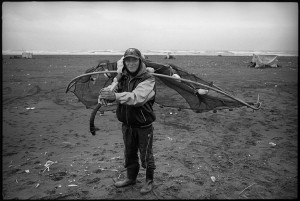
Photo courtesy of Avant.
Avant explained why fishermen look for glass eels.
鰻魚苗價格好時,一尾上看50元,運氣好的漁民一晚可以賺上一兩萬元,因此有人說鰻魚苗是「軟黃金」!
When the glass-eel market is hot, one glass eel is worth NTD 50. Fishermen who are lucky can earn ten to twenty thousand dollars in one day. Therefore, some people called glass eels “bio-gold.”
Avant talked about how the price of glass eels influences the fishermen.
鰻魚苗價錢高時,漆黑的海面上盡是扒鰻魚苗人的黑影,海灘上也有數不盡的點點燈火與天上的星星相輝映,賣麵食的,賣麵包的甚至賣羊肉爐的攤車直接開到海灘上,像夜市那樣的熱鬧!可是俗稱軟黃金的鰻魚苗價格卻是暴起暴落,有時甚至降到只剩下8元一尾!
When the price of glass eels is high, you can see tons of fishermen in the sea. There would be countless lights at the beach shinning with stars in the sky–lights for the vendors that sell noodles, bread, and even lamb-stew. Thus the beach becomes lively like a night market. However, the price of glass eels varies a lot. Sometimes one glass eel is only worth NTD 8!
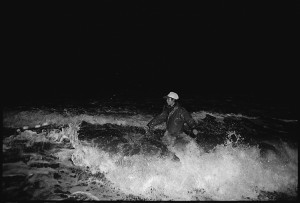
Photo courtesy of Avant.
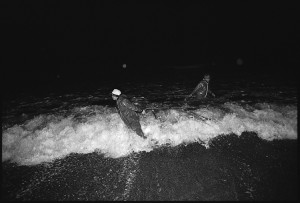
Photo courtesy of Avant.
鰻魚苗價錢高,大家下海大撈一筆這是可以理解的,可是價錢掉到只剩下8塊錢一尾,卻不得不下海扒鰻魚苗,生活的清苦不難想像。
When the price of glass eels is high, it is understood that many people will jump into the sea for them. However, when a glass eel only worth NTD 8, we can imagine what a difficult life the glass-eel fishermen are when they need to go into the sea for the damn cheap glass eels.
宋惠萍本來在樹林一家工廠工作,去年十一月失業後,來到蘭陽溪口和爸爸、媽媽、姐姐和姐夫一起住,順便幫忙扒鰻魚苗。她的爸爸和姐姐輪番下海扒鰻魚苗,她和媽媽在海灘上,從撈起的泥沙中挑出鰻魚苗。
Hui-Ping Sung used to work in a factory in Shulin. Becoming unemployed last November, she came to the outlet of the Lang-Yang river to live with her parents and her sister's family and help pick glass eels. Her father and sister take turns to go to the sea to catch glass eels, and she and her mother at the beach pick glass eels out of sands.
一家人工作一整晚,所得不到一百塊錢。宋惠萍的姐夫說,你要是看到大家都在海灘上喝酒,那就表示海裡沒有鰻魚苗可以抓啦!
Their family had worked for the whole night, but they only earned less than NTD 100. Hui-Ping Sung's brother-in-law said that if you see all the fishermen having a drink at the beach, you can say there is no glass eels in the sea.
There is also risk for catching glass eels in the sea. A fisherman Avant talked to said:
今年的扒鰻魚苗季,在蘭陽溪出海口就已經有一位被潮水拖走。
In the outlet of the Lany-Yang river, there have been one fisherman towed away by the tide since this glass-eel season have began.
阿將,年輕的宜蘭五結鄉人,最近因為沒有工作而到海邊扒鰻魚苗。他總是要先喝一口酒再下海扒鰻苗。他說他的一位朋友前陣子差點也被潮水拖走。那一晚他的朋友的魚衫褲不慎被海水灌進去,整個人像是被灌飽的氣球,站不住也動彈不得。接著整個人就被潮水拖走了!在駭浪之中,他機警的脫掉魚衫褲,脫的只剩下一條內褲,才得以游回來保住一條命。
A-Chuang, a young man from Wujie, Yilan, began to catch glass eels these days because of unemployment. He always has a drink of liquor before going into the sea. He said recently one of his friends was towed away by the tide because the pants were filled with water, similar to a balloon filled with air. If his friend did not take off the pants quickly, he could be dead already. When his friend swam back, he only wore his underpants.
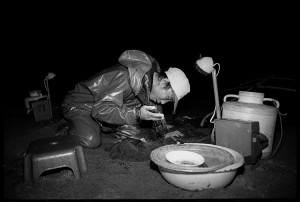
Photo courtesy of Avant.
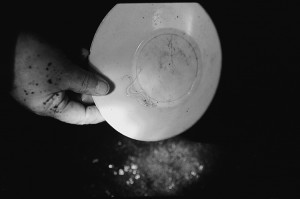
Photo courtesy of Avant.
這些像牙籤棒大小,全身晶瑩剔透的玻璃鰻在海中等待變態成鰻線 。
These toothpick-size, transparent glass eels in the sea are waiting to become elvers.
Avant talked about why he wanted to go to the beach and how he felt after talking to some fishermen:
“我從來沒有在夜間跑到海灘上的經驗,面對著無邊無際的黯黑,聽著看不見的海嘲的巨吼,很奇妙的感受,老實說,覺得很可怕!更難以想像的是,竟然有那麼多人在這樣的環境下討生活。”
“I have never been at the beach at night. I had a cold feet when surrounded by the endless darkness and the roaring tides. It is hard for me to imagine that there are so many people trying to make a living in this kind of environment.”
“強烈冷氣團來襲,在家裡溫暖而柔合的燈光下,和家人喝茶聊天或是窩在暖暖的被窩中睡覺是多麼幸福的事,可是,卻有一些人在在這樣惡劣的天候中,在一波波海潮中討生活。”
“When the cold air mass attacks, we are blessed to have a cup of hot tea and chat with our family in the warm and luminous living room or sleep on the beds. However, there are some people working outside in this harsh weather, who tries to make a living in the never-stopping tides.”
“那樣的落差實在太強烈了,強烈到我也想在這樣淒冷的夜晚,浪裡來浪裡去,倒底是怎麼樣的感受?”
“The strong contrast makes me wonder how it feels to fight with the tides at the cold, gloomy night.”
Like most of the fishing industry, eel farming also results in environmental problems, such as water shortage and land sinkage caused by the heavy extraction of groundwater. However, eel-farming is driven by the market. seafood pointed out why eel farming relies on glass-eel fishery heavily:
鰻魚是高經濟魚種,但是其魚苗來源,則全靠野生捕撈,目前尚無法完全養殖與育種。
Eels are expensive, but the glass eels are all from the sea. So far, we cannot hatch eel larvae and rear them in an artificial environment.
In fact, the population of the Japanese eels, along with the population of anguillid eels (fresh water eels) worldwide, have declined drastically in recent years (via Wikipedia). This is presumably due to changing water conditions, interfering with spawning and the transport of eel larvae (via Wikipedia). Latest technology seems to be able to reduce the environmental impact of glass eel fishery, as some Japanese biologists claimed that they have successfully rear eel larvae to glass-eel.













6 comments
Excellent work, guys. Very interesting stuff!
Stunning post and photos! Thank you!
Wow! These are nice pictures! Nature is really the best inspiration for art. Nature is really the best inspiration for art.